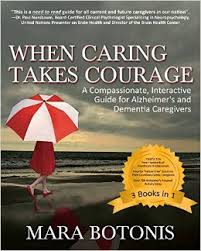Posts Tagged ‘Mara Botonis’
Enrich Life by Adapting Hobbies
We all want to be engaged in purposeful and fun activities. When we enrich life by adapting hobbies, we help people living with dementia stay engaged in activities that are meaningful and interesting to them.
Discover What’s Most Important
To adapt hobbies, ask yourself: What is most important about the activity?
For example, for gardeners, is it the feel of their hands in the soil? Is it producing flowers or harvesting vegetables? Is it having something to take care of?
For those who like quilting, is it the finished product or making the squares? Is it the companionship with other quilters? Or the texture and colors of the fabric?
For those who like cooking, is it the measuring and stirring? Do they enjoy the aromas and textures of the ingredients? Is it the joy of preparing something that thrills others? Or is it the simple pleasure of tasting delicious foods?
With those answers, you can support the aspects of the activity that really resonate. You can enrich life by adapting hobbies.
Here is a story about adapting your attitude.
Embrace the New News
That Tuesday morning, she walked into the kitchen and saw her husband, relaxed in his chair, drinking his morning coffee, and reading the newspaper. He loved his morning ritual and everything was as it always had been. Except now he was holding the newspaper upside down. At first, she was upset, angry that dementia had robbed him of reading. As she battled with her feelings, he hummed, a sign he was happy and content. She took a breath and realized, she too should be happy and content.
Go for the Greens
I love this story from Mara Botoni, author of When Caring Takes Courage. Here’s how she kept her grandfather, who was living with dementia, involved in his golf game. For a time, he walked the golf course and played with empathetic friends. When he could no longer play, he liked being driven around the course, enjoying the scent of freshly mown grass, the vistas of rolling green lawns, and the thwack of a well-hit ball. Later, at home, the family set up an indoor putting green and watched golf tournaments on television with him.
Deborah Shouse is the author of Connecting in the Land of Dementia: Creative Activities to Explore Together and Love in the Land of Dementia: Finding Hope in the Caregiver’s Journey.
Four Ways to Support Care Partners
We all know that wrenching feeling of wanting to support our friends who are immersed in being care partners but not understanding how best to help. Many of us know the feeling of being exhausted care partners and not knowing just how to ask for the help we need.
Mara Botonis, author of When Caring Take Courage, created a list of meaningful tips, captured in a note to friends from a care partner. I really appreciate her empathetic yet practical outlook and wanted to share a few of her ideas with you.
The Present in the Present
I so appreciate you wanting to help me, I don’t always have time to read a book, watch a movie, or accept your generous invites to restaurant meals or spa treatments. The best gifts save me time and energy and are a treat I can enjoy at home without arranging care. I would love a visit that includes a pre-made dinner we can share. Any of these thoughtful gifts would lift my spirits: a CD with my favorite songs, a favorite dessert or snack, a chance to play a favorite game with you, a soft cuddly blanket, or fresh flowers.
Write Me
Write me a note or an email. I can’t always talk on the phone or devote the time I’d like to an in-person visit. I’m usually only “free” to socialize when my loved one is sleeping and even then, I am alert to his needs. If you write to me, I can read it when I have time to truly enjoy it.
Share Memories
Reminisce with me. I willingly and lovingly put another person first for most parts of my every day. Sometimes I feel like big parts of me get lost so please remind me of our earlier times together. You may be the only one I get to do this with.
Please Stay in Touch
You don’t have to worry about saying or doing the right thing. I don’t always know what that is either. Please just keep trying. Don’t avoid calling or coming over because you may be feeling uncomfortable or unsure. I feel that way too sometimes and I’m here every day. Please don’t forget about me. I’m still here. I still love you. We still need and want you in our lives. Please reach out. There isn’t any way you can interact with me that would be unwelcomed or wrong. Just keep trying. #
After thirty years working in healthcare throughout the United States, Mara’s life was forever changed when a close family member was impacted by Alzheimer’s.
Please visit her website:
Website: http://www.whencaringtakescourage.com/
Deborah Shouse is the author of Love in the Land of Dementia: Finding Hope in the Caregiver’s Journey.
Four Page-turning books
 I have to say, I wasn’t really in the mood to read a memoir about the Alzheimer’s journey. But a friend recommended The Long Hello and I sat down to leaf through it. Four hours later, after both tears and laughter, I had completed the lyrical journey, an artful weaving of rational recall and poetic pouring. I could see and feel Cathie Borrie, the author, and I felt I knew her fanciful, magical, distracted, needy, exhausting, interesting mom. Cathie’s honesty and her ability to capture the intricate connections inherent in this dementia journey were like walking a familiar road through a mysterious jungle. This book is a burst of beautiful writing anchored by deep poignancy and meaning.
I have to say, I wasn’t really in the mood to read a memoir about the Alzheimer’s journey. But a friend recommended The Long Hello and I sat down to leaf through it. Four hours later, after both tears and laughter, I had completed the lyrical journey, an artful weaving of rational recall and poetic pouring. I could see and feel Cathie Borrie, the author, and I felt I knew her fanciful, magical, distracted, needy, exhausting, interesting mom. Cathie’s honesty and her ability to capture the intricate connections inherent in this dementia journey were like walking a familiar road through a mysterious jungle. This book is a burst of beautiful writing anchored by deep poignancy and meaning.
 I also really enjoyed Martha Stettinius’ Inside the Dementia Epidemic: A Daughter’s Memoir. Meeting Martha and her mom on the pages of her searching memoir was like rediscovering old friends. I identified with Martha and I was also caught up in her story. I was moved by her struggle to truly care for and take care of her mother, while still preserving her soul and her family life. Martha did a great job of creating a compelling and readable story, while offering a wealth of practical tips and resources.
I also really enjoyed Martha Stettinius’ Inside the Dementia Epidemic: A Daughter’s Memoir. Meeting Martha and her mom on the pages of her searching memoir was like rediscovering old friends. I identified with Martha and I was also caught up in her story. I was moved by her struggle to truly care for and take care of her mother, while still preserving her soul and her family life. Martha did a great job of creating a compelling and readable story, while offering a wealth of practical tips and resources.
 Several weeks ago, I wrote about my first visit to an Eden alternative home, the magical Sierra Vista in Santa Fe. The founder of Eden Alternative is Dr. Bill Thomas, who is one of the pioneers in making dementia care more home-like and person centered. His book, Life Worth Living: How Someone You Love Can Still Enjoy Life in a Nursing Home – The Eden Alternative in Action, is rich with ideas for care facilities. Home care partners can use his concepts to make their household even more creative and welcoming. As a bonus, Atul Gawande wrote about Dr. Thomas, in his fascinating book, Being Mortal. You’ll be inspired by Dr. Thomas’s innovation and his tenacity.
Several weeks ago, I wrote about my first visit to an Eden alternative home, the magical Sierra Vista in Santa Fe. The founder of Eden Alternative is Dr. Bill Thomas, who is one of the pioneers in making dementia care more home-like and person centered. His book, Life Worth Living: How Someone You Love Can Still Enjoy Life in a Nursing Home – The Eden Alternative in Action, is rich with ideas for care facilities. Home care partners can use his concepts to make their household even more creative and welcoming. As a bonus, Atul Gawande wrote about Dr. Thomas, in his fascinating book, Being Mortal. You’ll be inspired by Dr. Thomas’s innovation and his tenacity.
 It’s not often that you read a book about dementia care and laugh. But when Mara Botonis wrote about carefully laying out supplies for a creative arts project, only to have her loved one staring out the window, then studiously plucking lint from his sweatpants, I had to laugh. I could see my beautiful mom doing exactly the same thing. Mara’s book, When Caring Takes Courage: A Compassionate, Interactive Guide for Alzheimer’s and Dementia Caregivers, is all about making the most of our moments together. Mara knows about dementia from her career in senior living and she has taken the personal dementia journey with her beloved grandfather. She orchestrated the book to make it easy for the exhausted care partner to problem solve and get instant help. She offers activities and projects for a range of abilities and situations.
It’s not often that you read a book about dementia care and laugh. But when Mara Botonis wrote about carefully laying out supplies for a creative arts project, only to have her loved one staring out the window, then studiously plucking lint from his sweatpants, I had to laugh. I could see my beautiful mom doing exactly the same thing. Mara’s book, When Caring Takes Courage: A Compassionate, Interactive Guide for Alzheimer’s and Dementia Caregivers, is all about making the most of our moments together. Mara knows about dementia from her career in senior living and she has taken the personal dementia journey with her beloved grandfather. She orchestrated the book to make it easy for the exhausted care partner to problem solve and get instant help. She offers activities and projects for a range of abilities and situations.
What books are spurring you onward these days? I’m immersed in writing my new book, tentatively titled Creativity in the Land of Dementia, so I’m focused on the topic in all its forms. The great news is that there are so many amazingly imaginative people out there, making the world a more connective and creative place for those living with dementia, their care partners, family, and friends. Which means, making the world better for all of us.
Deborah Shouse is the author of Love in the Land of Dementia: Finding Hope in the Caregiver’s Journey.



